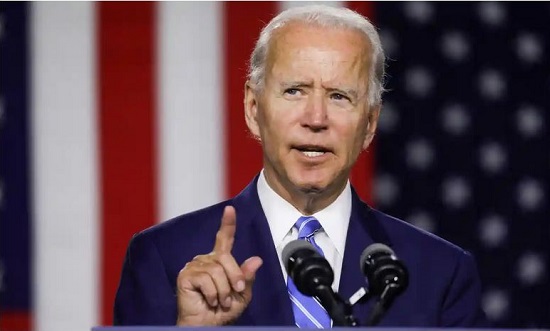
Our Prime Minister Scott Morrison refuses to commit to net zero carbon emissions by 2050 and Joe Biden’s election as US president will not change Australian climate policy.
Joe Biden calls climate change the ‘number one issue facing humanity’:
- “Climate change is the existential threat to humanity,” the former vice president said. “Unchecked, it is going to actually bake this planet. This is not hyperbole. It’s real. And we have a moral obligation.”
Bill Hare, an Australian a physicist and climate scientist, founder and CEO of Climate Analytics based in Berlin (with branches in Lome, Togo and New York, USA and now Perth, WA), Adjunct Professor at the Murdoch University, and a Visiting Scientist in the Earth System Analysis at the Potsdam Institute for Climate Impacts Research since 2002 says Joe Biden’s move to net zero emissions will leave Australia in the (coal) dust.
Hare points out:
-
the EU, China, Japan, South Korea and the US – about two thirds of the global economy, about half the world’s emissions and close to 75% of our fossil fuel export markets –will have net zero goals for 2050 or shortly afterwards. This is a massive shift.
He says markets for coal, oil and gas should be more or less halved by 2030. Also:
- In 2019 China, South Korea and Japan accounted for 72% by value of Australia’s exports of LNG and coal: 88% of Australia’s LNG exports; 75% of thermal coal exports; and 51% of metallurgical coal exports. It is notable that none of these countries have focused on natural gas and all have mentioned renewable energy and other technologies, and all recognise that early action on coal is needed.
Australia can expect border tariffs on exports of goods manufactured here and will be diplomatically isolated. That isolation will also impact our relations with our Pacific neighbours.
Biden as president would pursue climate ‘cheaters’, Australia could be among them. In fact here’s the list of ‘climate outlaws’, in alphabetical order:
-
Australia, Brazil, China, Indonesia, Mexico, Russia and Saudi Arabia.
Part of the problem with China is its practice of building coal-fired power stations in other countries through its belt and Road initiative, an issue also mentioned by Kevin Rudd.
Jake Sullivan, who was the national security adviser to Biden when he was vice-president and is now in the candidate’s inner circle, says Biden won’t ‘pull any punches’ on what is a global problem:
Sullivan said there was “no reason it has to get awkward” for countries like Australia.
“The vice-president is not going to come to play games around that issue if he’s fortunate enough to be elected. He’ll lay it out in the way only Joe Biden can do – just plain and straight, down the line, respectful – but he’s not going to pull any punches on it.”
John Quiggin in On coal, oil and gas, Australia is becoming more isolated says:
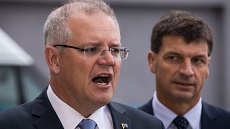
- Contrary to Scott Morrison’s blustery claim — “I tell you what, our policies will be set here in Australia” — most of the important decisions about our energy future will be made elsewhere, by governments in Washington, Beijing and Brussels, and by energy companies and financial institutions headquartered in New York, London, Frankfurt and Tokyo.
Their decisions are reflecting the widening realisation that the world must abandon coal sooner rather than later, that our reliance on oil must also end and, increasingly, that gas is part of the problem rather than of the solution.
(Photo added)With 47 church organisations, 42 of them Catholic, now joining the ‘fossil fuel divestment’ movement, we currently have:
- 1,200 organizations and businesses worldwide that since 2012 have publicly pledged to divest more than $14 trillion.
There is concern that if Biden does not win the two Georgia Senate seats to be decided in a poll of January 5, he will have trouble getting climate legislation through Congress. Others have pointed out two main ways he can act if that happens.
Firstly, there is vast scope through executive orders and regulations.
Secondly, he is apparently selecting his whole administration team to be climate-oriented. People are watching and will let him know, as in Senior Biden adviser set for key role has ties to oil and gas, climate activists warn.
CNN has a useful summary on how things may unfold in Biden will rejoin the Paris Climate Accord. Here’s what happens next.
The Trump administration dismantled more than 70 major environmental regulations in four years, which can be reinstated by Biden, with improvements.
Climate Home sees Biden’s election as pivotal for climate change, with the focus on the third quarter of 2021 at the delayed COP26 UN climate talks to be held in Glasgow. For one thing:
-
His climate platform states that he will work with international financial institutions to provide “green debt relief” to developing countries.
“The biggest practical contribution Biden could make to Cop26 is to stop the US blocking new global funding for green Covid-19 recoveries at the IMF and World Bank,” said Nick Mabey, chief executive of E3G.
Biden will need to work with China, the UK and the EU who will also hold him accountable.
Meanwhile Peter Sainsbury’s Environmental roundup at the blog Pearls and Irritations finds that the cost equation is rendering coal and gas redundant:
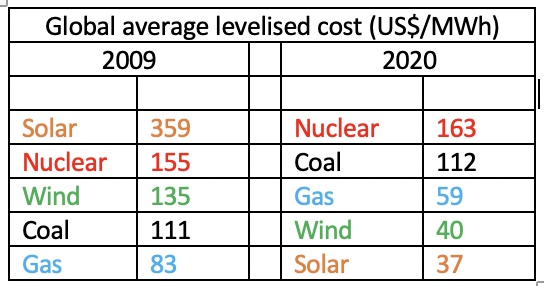
Remember when Morrison appointed Angus Taylor as Minister for Energy in August 2018, and then as Minister for Energy and Emissions Reduction after the election in 2019, the focus was on prices and energy security, and specifically not on renewable energy and emissions reduction, making their intention clear:
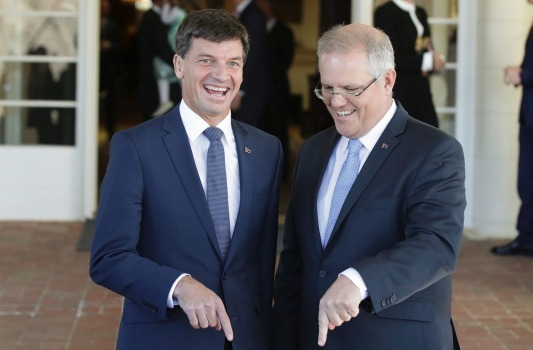
There was also talk of carrying a big stick to threaten energy corporations, taken up here by cartoonist David Rowe:
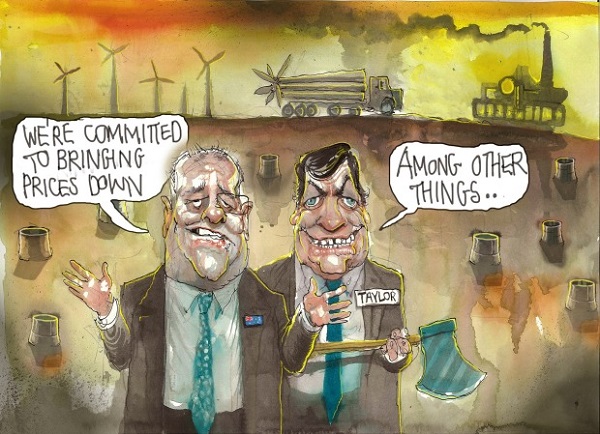
Morrison has continually talked as though climate change action would cost the economy, whereas Deloitte Access Economics has looked at climate action versus inaction and found A new choice: Australia’s climate for growth.
The choice is between doing nothing, which will cost the economy $3.4 trillion and 880,000 fewer jobs in just 50 years, and climate action for growth to create an economy $680 billion bigger, with 250,000 more jobs in 50 years.
The choice is a no-brainer, but Morrison’s choice for our country is for a gas-led post-Covid recovery.
For commentary on this see Penny Sackett, Australia’s chief scientist from 2008 to 2011, in the SMH Gas is not a transition fuel to a safe climate. That ship has sailed and the Grattan Institute’s Flame out: the future of natural gas.
Meanwhile a Climate Transparency report, an assessment by 14 organisations released before this weekend’s virtual G20 summit, has found Australia’s climate record labelled ‘simply embarrassing’ and among worst of G20 nations.
Scott Morrison has said he would like to achieve zero net emissions by 2050 or as soon as we can do it and has recently signalled retreat on using carryover credits to meet emissions targets.
However, he has on board people like Craig Kelly who warns it would be ‘political suicide’ for Scott Morrison to adopt net zero by 2050 target.
In the past I have called them Coalsheviks. Perhaps Marian Wilkinson’s term The Carbon Club may be more apposite, but covers also the carbon apologists in industry and elsewhere.
Wilkinson details how John Howard’s policy was to do as little as he could get away with on climate, while not wanting to buy into debates about whether climate change was real, and his government continued to promote fossil fuels. This policy was only viable internationally because George W Bush’s refusal to sign the Kyoto Protocol gave him cover.
That kind of cover is about to disappear for Morrison. His policy has been to use cheap accounting tricks as cover for doing as little as possible.
So while the cost-benefit issue has flipped, no-one in the Coal-ition seems to have noticed. The costs of inaction are humungous.
There is some optimism that a Biden victory will put the world ‘within striking distance’ of the 1.5°C Paris goal. However, what is not appreciated is firstly, zero emissions for the whole planet will only give a 66% chance of staying within 1.5°C, and secondly, advanced countries should get to net zero before 2050 in order to allow the developing countries extra time to get there. (See the World Resources Institute What Does “Net-Zero Emissions” Mean? 6 Common Questions, Answered for an objective exposition on this issue.)
Adam Bandt (see Net-zero by 2050 not enough, Australia’s leading climate scientists say) is one politician who understands this, but he hardly ever says so.
Moreover, there is an assumption that a two-thirds chance represents acceptable odds, that there won’t be any tipping points before then, and that it is acceptable for an already dangerous climate to become worse in terms of effects already evident. For example, bushfires, droughts, floods, cyclones, bleaching of the Great Barrier Reef, ocean acidification, sea level rise that will drown many of our Pacific neighbours, impinging on large swathes of real estate on our coastlines, and so on.
If we are to have a future on the planet, we can’t allow coal and gas-fired assets to run their course, and any new developments will surely become stranded assets. Net zero by 2050 is far too late for a safe climate. I’ll explain more in another post.
While we fiddle Rome burns. Here from the CSIRO-BOM State of the Climate 2020 report is the news that total GHG emissions expressed as CO2-equivalent reached 508 ppm in 2019:
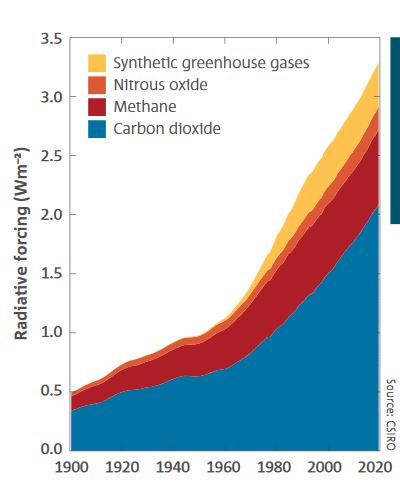
Back in December 2007 James Hansen told us this number needed to reduce to 350ppm. There are no politicians I know in Australia, including Mr Bandt, who are taking him seriously.
Below I’ve retained all the links I gathered for this post but did not use, in no particular order:
Bill McKibben says Biden’s Most Daunting Adversary will be the physics of climate change.
- Scientific American – Here’s How Scientists Want Biden to Take on Climate Change
- Richard Holden – Vital Signs: a global carbon price could soon be a reality – Australia should prepare
- Andrew Clark AFR – Climate wars evolve into a contest of targets
- Blueprint Institute Powering the next boom
Update:
I haven’t seen any analysis on why Biden won. Joel Fitzgibbon is maintaining it was not because of his climate policy, rather COVID and a vote against Trump.
Certainly Biden’s campaign strategy seemed to be to make the election a referendum on Trump.
Nevertheless, Biden consistently stated climate change as his top policy issue, and did not seek to bury it.
Interesting now is the criticism from Alexandria Ocasio-Cortez that the Democratic Party campaign was incompetent, and that the reason the Democrats lost ground in the congressional vote was that they did not push progressive issues and climate change, In contests where the campaign on the local level did emphasise these issues they did well. See Alexandria Ocasio-Cortez ends truce by warning ‘incompetent’ Democratic party.
In Business Insider Biden’s climate change policies are better than Trump’s, but they still aren’t enough to prevent a climate catastrophe supports the AOC view and stresses that the Democrats will lose ground in the mid-terms if they don’t embrace broader green issues that go beyond a return to Obama’s policies.

This morning I’ve added an update as follows:
I haven’t seen any analysis on why Biden won. Joel Fitzgibbon is maintaining it was not because of his climate policy, rather COVID and a vote against Trump.
Certainly Biden’s campaign strategy seemed to be to make the election a referendum on Trump.
Nevertheless, Biden consistently stated climate change as his top policy issue, and did not seek to bury it.
Interesting now is the criticism from Alexandria Ocasio-Cortez that the Democratic Party campaign was incompetent, and that the reason the Democrats lost ground in the congressional vote was that they did not push progressive issues and climate change, In contests where the campiagn on the local level did emphasise these issues they did well. See Alexandria Ocasio-Cortez ends truce by warning ‘incompetent’ Democratic party.
In Business Insider Biden’s climate change policies are better than Trump’s, but they still aren’t enough to prevent a climate catastrophe supports the AOC view and stresses that the Democrats will lose ground in the mid-terms if they don’t embrace broader green issues that go beyond a return to Obama’s policies.
“How hard will it be to find new jobs for coal miners?” https://www.thefifthestate.com.au/energy-lead/business-energy-lead/how-hard-will-it-be-to-find-new-jobs-for-coal-miners/ Among other things it said:
“Last week, The Australia Institute released a report that investigated the challenges and opportunities of getting out of coal. This included casting a critical eye on the apparent abundance of employment opportunities afforded by the coal mining sector – a factor that’s frequently cited as a reason to keep the industry afloat.
Based on the most conservative reading of Australian Bureau of Statistics data, as of August 2019 the coal mining sector employed about 46,000 people, with about 20,000 to 25,000 in thermal coal (the remained in metallurgical coal).
To drill down further on these figures, the report asserts that only around 5000 are employed in roles that are specific and unique to producing thermal coal and/or mining in general. The remainder are managerial, professional and clerical white collar professions, or trade occupations such as truck driving and carpentry – all easily transitioned to other industries.
Looking at these figures, there’s not astounding numbers of people to retrain and, as the report points out, a plethora of options to fairly and justly do so.
Perhaps the most obvious is the just under 20,000 jobs in renewable energy activities at present, set to at least double if the energy sector is to be decarbonised.”
It also mentioned that the average age of coal industry workers was 42. A fair slab of these would be retired by 2050
The Deloitte report has no new information. We’ve been discussing this around and around for a decade and a half here and the substance hasn’t changed, only the environment has around us as we are repeatedly frustrated by corporate ideological power.
bilb I think I agree with you.
Genuine climate deniers probably represent 10-15 % of the community, but pollies in power a bit more than that.
Unfortunately they have a stranglehold on the system.
John, thanks for the link. I didn’t set the post up to examine transition issues, but I have a couple of thoughts.
First, I think that with the evident dangerous nature of the climate now and the risk it will get worse means that we have to stop pussy-footing around. Miners earning big bucks also have kids and grandkids.
Secondly, they can’t expect everything to be handed on a plate. Governments can assist in various ways, but communities that will endure will usually do so because they take a hand in forging their own future.
Third, people like Joel Fitzgibbon can’t count. He says Labor needs to win a couple of central Qld seats to win government, which is not strictly true. There are more seats to be lost and not gained in SE Qld if Labor takes a coal-friendly stance.
Biden has appointed John Kerry as his climate ambassador.
Last night I was rummaging around and found this in Climate clippings 70 on 11 March 2012:
In the article it said that Hans Joachim Schellnhuber, who advises Angela Merkel on climate change, had dropped in on President Obama’s top people, who told him that the political system couldn’t cope with what he was saying about the science. Prof Schellnhuber was not impressed.
“We will pay a heavy price for this”, Turnbull savages Morrison and Taylor over climate
Turnbull says Morrison was suckered by Trump.
“We will pay a heavy price for this, believe me, in international trade. We are kidding ourselves to think that the Europeans will not have climate as an element free trade agreements. Absolutely kidding ourselves,” Turnbull said.
“And I can see the Americans making it a condition of trade agreements right around the world. What Scott’s got to do now is pivot or dismount, whether it’s done elegantly or not, doesn’t really matter as long as he does it.”
And:
Turnbull was particularly scathing in his assessment of federal energy and emissions reduction minister Angus Taylor, suggesting Taylor was primarily motivated by wanting to appease right-wing supporters and media.
“Angus is a highly numerate guy, but sadly, just about everything he says about energy is political,” Turnbull said. “And it’s aimed at securing and maintaining his base of support on the right-wing of the Liberal Party, and with their backers and amplifiers and the right-wing media, principally owned by Rupert Murdoch.”
“Angus Taylor, who has genuinely united the energy sector in a way that no other ministers has ever done – he says, they’re wrong, they’re wrong, he won’t disclose his own modelling on the gas-fired recovery, but demands everyone else disclose their modelling. We’ve got to get real here – we know that we need urgently to cut our emissions and we also know that the cheapest form of generation is from variable renewables, wind and solar.”
The long and short of it is that Morrison has pivoted in his language, but unless he sacks Taylor, nothing will change.
A change in language won’t fool anyone on the international stage.
Brian: RenewEconomy had an interesting article on “Big batteries are getting bigger and smarter, and doing things fossil fuels can’t do.” https://reneweconomy.com.au/big-batteries-are-getting-bigger-and-smarter-and-doing-things-fossil-fuels-cant-do-96815/
The guts of it is that batteries can do much more than provide energy storage. Things that fossil power cannot do.
Morrison is connected to Trump at the hip ideologically dragging Australian’s down Trumps ill conceived “policy” path. The real question is whose interests are being served.
This item should cause great concern
https://www.msnbc.com/rachel-maddow/watch/trump-bails-on-surveillance-treaty-used-to-monitor-russia-guts-program-of-resources-96491077633
Why would a president halfway out the door take such an action? There is only one person who benefits from this and that is Putin who can now mount military operations in complete radio secrecy.
Trump is a traitor through and through, but Australian interests have been dragged along by Morrison’s sycophantic subservience to a Psychopathic Traitor, climate action being compromised in the process.
Thanks bilb2.
The Open Skies Treaty is very interesting. Wikipedia has a short article.
Don’t worry, Russia won’t be free of surveillance. There is still satellite surveillance and long distance interception of radio and other signals.
Step forward NSA, GCHQ, Australian Signals Directorate, counterparts in many advanced nations. Internet surveillance.
Then there are commercial oversight agencies such as Gurgle, Facefist, EFT.
I wish someone would ask Morrison if he agrees with Trump that the Paris agreement had nothing to do with the environment but was aimed only at destroying America’s economy.
zoot, I think the press are being a bit sycophantic towards Scotty in recent times. At the very least they have been giving him an easy time.
Here’s a NYT article via Lethal Heating on Kerry – With John Kerry Pick, Biden Selects A ‘Climate Envoy’ With Stature .
Apparently he was into Climate change from the Rio Summit on, and instrumental in getting the Paris deal over the line. Biden has made him a cabinet minister. He will not have to face Senate confirmation, according to Mr. Biden’s transition team.
The move marks the first time the National Security Council will include an official dedicated to climate change, “reflecting the president-elect’s commitment to addressing climate change as an urgent national security issue,” the transition team said in a statement.
Sounds good to me!
zoot at 7.18pm
As Australia isn’t withdrawing from the Paris agreement, the PM’s opinion of that person’s opinion doesn’t really matter much, I believe.
It looks like a lame duck, quacks like a lame duck, walks like a lame duck: heavens to Betsy, mebbe it’s a lame duck! [with apologies to the historical record].
Someone commented on the absurdity of a Lame Duck pardoning a Turkey.
Turkeys everywhere you look, bb.
(When I were a lad, loike, ‘n we lived in a drain beside road, summat in picture magazines about BB, ’twere a French bird, loike. Is the great BB an ancestor of yourself, bb?)
LNP NSW Energy Minister Matt Keane: “We stared down big energy”: Kean hails ‘historic” bill after marathon debate” https://reneweconomy.com.au/we-stared-down-big-energy-kean-hails-historic-bill-after-marathon-debate-78950/
“The NSW government has claimed a major victory in energy policy, successfully passing legislation implementing its ambitious electricity infrastructure strategy, establishing and enshrining five new renewable energy zones into law.
Kean claimed the passage of the bill – after a marathon 30-hours debate caused by more than 200 proposed amendments by One Nation’s Mark Latham – as a ‘historic victory’ and one in which the state had successful “stared down big energy”.
The legislation is designed to facilitate the construction of up to 12GW of new wind and solar projects, and 2GW of storage capacity, spurring as much as $32 billion in investment over the next decade and replace much of the coal capacity due to retire over the next 10-15 years.
“The passing of the Electricity Bill is a historic victory for the people of NSW. It will deliver thousands of jobs, billions in investment & some of the cheapest reliable energy in the world. It only occurred because Australia’s leading political parties & indies worked together,” Kean tweeted following the passage of the bill.
In Qld “Australian energy utility Origin Energy has thrown its hat into the ring for the promising green hydrogen sector, flagging plans for a hug 300MW electrolyser in Townsville and production of more than 36,000 tonnes of green hydrogen a year for the export markets.” https://reneweconomy.com.au/origin-eyes-huge-townsville-green-hydrogen-project-five-big-battery-options-15116/
The renewable stories go on and on. Can’t these bastards understand the grand Morrison/Taylor/Trump vision?
John
It has been common for States to differ markedly from the Commonwealth on energy and renewables policies.
We recall the attacks on SA Labor after the Dirty Big Storm a couple of years ago.
Victorian Labor is rolling out home solar pv, solar hot water, through subsidies and low interest loans (and including renters/landlords, not only homeowners).
And the NSW Libs are the latest stars!!
I think that NSW Matt Kean story is the most hopeful thing I’ve seen in sorting Angus Taylor out.
Taylor is still saying if someone doesn’t commit to replacing Liddell with 1000MW of gas, then they will do it through Snowy.
AEMO and NSW say it’s not needed. Taylor says that according to his modelling it is, but no, he won’t show anyone his modelling.
What we then now is for the state of NSW to deny them development approval.
Kevin Rudd – Australia Needs A Climate Policy Turnaround – Not A Pathetic Crab Walk .
Rudd reckons Scotty from Marketing will be forced to adopt net zero by 2050, but then won’t do anything to achieve it.
Rudd is probably right. Rudd also says that the rest of the world is onto Australia on this one. Scotty will fool no-one.
Brian: 2050 is 30 yrs away so 2050 targets don’t mean all that much and aren’t worth arguing about. What I am really interested in is what happens in the next few years.
My take in general is that business and individuals have decided to go renewable no matter what the marketing man says.
John, what we aim at over the next 30 years determines the degree of urgency with which we tackle the issue. Under the IPCC regime we are being offered a 50% chance of success in keeping warming to 1.5°C, but even that may result in a cooked planet.
None of the party policies, including the Greens, treat the issue as a genuine emergency.
What Adam Bandt has said is that net zero by 2050 might lead to runaway climate change. So the Greens are going for net zero by 2045, which might lead to runaway climate change. If not, it still sees 70 to 90% of the GBR die, sea level rise which will swamp many of our Pacific neighbours and threaten mush real estate on the Australian coastline, see heatwaves and fire regimes get worse, make agriculture as we know it extremely difficult, etc etc.
There is a lot of focus on renewable energy, but it’s only 35% of emissions (from memory) and the low hanging fruit.
“There is a lot of focus on renewable energy, but it’s only 35% of emissions (from memory) and the low hanging fruit.”
It would be much higher than that if renewable energy is used for renewable transport, renewable hydrogen, renewable ammonia and, and…….
It is not all that long ago that people thought we needed a carbon price to drive the change. Now our government is talking about the need to subsidize a new gas fired generator if it is going to compete with renewable electricity.
John, I was going to mention transport (about 15%) as the second lowest fruit. Still needs a lot of work to be done. Then the other Kyoto gases amount to about an extra 25% on top of the CO2.
None of the policies reflect a climate emergency. I have to attack the net zero by 2050, and the Greens net zero by 2045 because it reflects official complacency. Adam Bandt is not helping. He just likes to point out the Greens are better than Labor.
Well, they are, but they are still on the road to perdition.
Brian: “I have to attack the net zero by 2050, and the Greens net zero by 2045 because it reflects official complacency.” What really counts are:
1. Peak atmospheric CO2 equivalent. (Rather than how long it takes to reach net zero emissions.)
2. How fast the growth in atmospheric CO2 is slowed. (Getting the easy things down quickly may slow or defer the crisis.)
Hence my emphasis on short term action vs long term promises.
Brian: Interesting one on how NSW coalition government could become “Labor’s unlikely climate saviour”: https://insidestory.org.au/labors-unlikely-climate-saviour/
“The politics of climate change policy in Australia has been the story of good people trying to vainly break the nexus between energy and carbon emissions by delicately tweaking and working within the existing market-oriented structures, usually heavily guided by the incumbent industry and regulatory organisations. Instead of trying to unpick this Gordian Knot, Kean and Barillaro decided they would cut straight through it with a sharp instrument. Their Electricity Infrastructure Roadmap, released this week, will supplant the existing market by setting up new government authorities to rebuild the electricity system anew, much as state governments did four decades ago.
The scale of the plan might be audacious, but it will probably strike the person in the street as plain common sense. The owners of four of the state’s five existing coal-fired power plants, representing 87 per cent of capacity, have indicated they intend to close them between now and 2035. At the same time, they say they will have trouble financing replacement plants because of regulatory uncertainty about carbon emissions. Kean and Barillaro have therefore laid out a program to remove the investment uncertainty and underwrite the construction of the renewable power plants, energy storage and power lines needed to replace the coal plants before they close.”
Definitely worth a read by a Labor climate action person.
John, re your 3:46 PM comment, what matters is the area under the graph, which reflects how much CO2 you’ve put in the atmosphere:
The later you start, the harder you have to go, and the sooner you have to reach net zero.
That graph was from the post A choice of catastrophes: the IPCC budget approach where I explained the ‘climate budget approach’. That graph was for a 67% chance of staying below 2°C , and I think is still about right.
That’s why we have to go flat out as a climate emergency, go for net zero ASAP, say at 8-10% per annum, and, in addition, do some emissions drawdown. That’s what I want politicians to be talking about.
BTW here’s the pie chart of emissions by sector from that post:
Brian: “The later you start, the harder you have to go, and the sooner you have to reach net zero.” Precisely. That is why I argue for challenging short term goals (During the next term of government) rather than goals for where we aim to be in 30 yrs time.
John, my view has always been that we need to achieve net zero by 2030, which would require recognition of climate change as a national emergency. The 30-year goals produce complacency.
David Spratt has always been in a hurry, and in his latest When climate risks are so high, short term actions matter most he gives a nod to Adam Bandt.
Matt Kean is certainly a gift to the nation. I saw an article where he was invited to give thew opening address to a conference of one the green groups. As a Liberal minister that’s not bad going!
At the Greens NSW state conference this weekend. The Greens are very positive about the deal they did with Matt Kean. No mutterings about Bandt not pushing hard enough.
I am fairly positive at the moment both re what is happening in Aus and the world.
Thanks, John. Interesting times.
Katharine Murphy has done two pieces relevant to the topic of the post:
Scott Morrison’s climate language has shifted – but actions speak louder than words
She documents how his language shifted, but probably no action will be forthcoming as a result.
The prime influencer and the pork-barreller: voters deserve better
Everything Morrison does is choreographed for making an impression. He’s more concerned with how things look than how they are.
Brian: Adam Brandt spoke to the NSW Greens for about an hour this weekend. Certainly on the ball when it came to climate action, just transitions, renewable hydrogen and a range of other topics. You know how picky I can get on these topics but I found nothing to pick on what he said on these fields and others.
He has an industrial lawyer background which probably drives his very strong support for social justice.
John, I’ll take that as good news. Sounds better than Di Natale.
I’m doing a post which might show my reservation (if I haven’t tied myself up in knots).
Brian,
Please un-knot yourself*.
Your blog needs you.
Ambi
* assuming your self-diagnosis is anywhere near accurate.
New post is now up, Ambi. See Our beds are burning. You will see that I have not been idle, but I didn’t burn my bed!